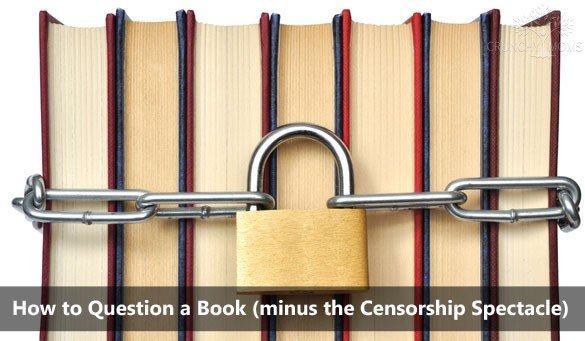As I learn more about Common Core, I frequently see complaints about offensive books used in public school. While we all want to protect our children, no one wants to start a censorship spectacle in their community. So, what should you do if you discover your child is reading a book for school you find questionable?
First, decide “Why does this book bother me?”
Before talking to anyone at the school, pinpoint why the material bothers you. Annotate the text with specific objections. Common complaints include: developmentally inappropriate content, violence, profanity, sexual content, substance abuse, racism, opposing politics or religious views. Pause to decide if the content is truly inappropriate. At some point, our children must address the hard and ugly aspects of the world; consider if now is the time to guide your child through this content.
Next, ask the teacher “Why is this book being used?”
Usually, another text exists with equal educational value, so ask why the teacher chose this book. As a high school English teacher, part of my decision to teach a book is my willingness to defend it. A few books I’ll defend to the grave, while others I deeply respect, but will never choose to teach.
The teacher may insist on this book. If so, ask how the teacher deals with the objectionable content. Is the teacher providing context, appropriate supplemental information, and opportunity to discuss the content? You may discover the teacher is not supporting the content, which needs rectifying.
The teacher may use the book to teach an ugly aspect of humanity, which is a huge purpose of literature. You must decide if you agree with this content for your child.
Most of the time, teachers would agree to a different text under a few circumstances. The teacher needs access to substitute books, as well as time to re-plan lessons. Also, the teacher is unlikely to end a unit abruptly; neither teacher nor students want to discard the work they’ve done so far.
Lastly, explain how you want the book restricted.
If you come to an impasse, consider how you want the book restricted.
You don’t want:
- your child to read it.
- the class required to read it.
- it in the classroom , but it can be in the school library.
- it anywhere at the school.
Requests limiting more than your child enter censorship territory. Yet, its valid to reject the text’s requirement as a full class read because your child’s learning experience might be negatively affected. If your child receives substitute materials, he might spend most of class working alone in another room, removed from classmates and one-on-one help.
Involvement versus Reaction
How do you proactively avoid inappropriate material versus reacting to material your child already read?
- Ask for a reading list. Hopefully, the teacher makes selections based on the students, so you should ask periodically.
- Read ahead of your child. Ideally, read the book before its assigned, but at minimum read a chapter ahead.
- Engage your child in discussion of the material based on your family values.
- Offer assistance in dealing with the questionable aspects of the text. You could provide resources offering differing points of view or ask to participate in discussion or activities with the students.

